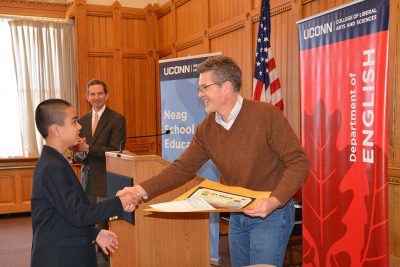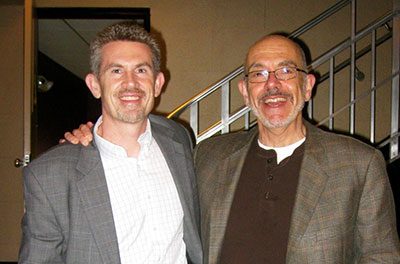In our recurring 10 Questions series, the Neag School catches up with students, alumni, faculty, and others throughout the year to offer a glimpse into their Neag School experience and their current career, research, or community activities.
Jason Courtmanche ’91 (CLAS), ’06 Ph.D. has been serving in a variety of capacities at the University of Connecticut for 23 years. A lecturer in the University’s English department, he also is assistant coordinator of the Early College Experience English program and affiliate faculty in the Neag School’s Department of Curriculum and Instruction. He advises English majors who want to be secondary English teachers, including those who want to enroll or are enrolled in Neag School programs.
He received his bachelor of arts in English from UConn in 1991 and in 1992 also completed the Teacher Certification Program for College Graduates (TCPCG) when it was still a nondegree program in the School of Education. After having earned tenure as a high school English teacher, he returned to UConn to complete his Ph.D. in English in 2006. He also had attended Humboldt State University in Arcata, Calif., for his master of arts in English.

Courtmanche primarily serves as director of the Connecticut Writing Project (CWP), which immerses Connecticut teachers in an intensive writing program where they grow as writers, learn about teaching writing, and have the opportunity to become published in one of CWP’s literary magazines. The foundation of this work involves running CWP’s Summer Institute, a six-credit program for teachers focused on improving the teaching of writing through research and the development their own portfolios of writing. Courtmanche also serves as coordinator for the Library of Congress’ annual Letters About Literature contest, for which students in grades four through 12 write about how a piece of literature affected their lives. In recent years, Courtmanche and fellow contest coordinator Douglas Kaufman, along with the Neag School and English Department as co-sponsors, increased contest participation in Connecticut by 53 percent.
You’re the director of the Connecticut Writing Project, which publishes teacher and student work in literary magazines. Why are these resources important for teachers and writers across the state? There’s a lot of research that says a real audience and a real purpose provide tremendous motivation for students to actually put in more time and more effort and take their writing more seriously. Getting published and having an audience is an incredibly empowering and validating thing.
“Our reasons for writing aren’t purely economic;
they are personal, they are community, they are civic.
At times, when the economy is weak,
people see humanities degrees as a luxury.”—Jason Courtmanche, ’91 (CLAS), ’06 Ph.D.
There’s been a push for STEM-focused education programs. Do you think writing and reading have been devalued? Why or why not? In recent years, there’s been a corporate reform asking educators to be an engine of economic renewal, so the language is about making people capable of writing for business purposes — which shouldn’t be the be-all and end-all for writing instruction. We think more broadly about what writing and English are. We really think about students being career- and college-ready, but also community-ready, like writing for the sake of civic engagement. Our reasons for writing aren’t purely economic; they are personal, they are community, they are civic. At times, when the economy is weak, people see humanities degrees as a luxury.
You are the first in your family to pursue a doctoral degree. What made you want to enroll in a Ph.D. in program at UConn? I knew so little about graduate school because no one in my family had done a Ph.D., and I thought to myself, “I’m 30 years old and if I do a Ph.D. program, I should do it now.” I did it by working really hard and not sleeping very much. It took me seven years and an extra semester. As an undergrad, a lot of my professors told me I should pursue a Ph.D., and I didn’t know how to go back and dedicate myself as a scholar. To get a Ph.D. in a content area was a mystery to me.
You were one of the last classes to graduate from the School’s Teacher Certification Program for College Graduates when it was a nondegree program. Why did you enroll in the program and how has that shaped your career? For today’s Integrated Bachelor’s/Master’s [IB/M] students, they really have to arrive at UConn knowing they want a career in education. Not every student is this certain as a first- or second-year college student. For me, that’s what was great about TCPCG. I was simply not that certain about my goals as an undergrad. I was a good student, but I wasn’t really ambitious. Going into senior year, I hadn’t given my post-undergraduate career a whole lot of thought. … I learned about [TCPCG], and I found out I was good at teaching. I taught at an alternative high school, and that was a great experience.
The other thing I liked about TCPCG [a one-year graduate program] is that its students have many more options as undergrads to do other things. As an undergrad, I wrote and edited for the Daily Campus, worked for ConnPIRG, minored in sociology. These things wouldn’t have been as possible had I been in the School of Education [which at the time did not offer a dual-degree IB/M program]. But without clinicals and student teaching and education classes in addition to English classes, such options are easier to pursue, and at the end of the program a student can bring those experiences to their future classroom.

Why have you dedicated more than 20 years to working as a professor and advisor at UConn? There’s much that I find rewarding about teaching writing at UConn. I think one of the most rewarding things comes from working with students who are not English majors and who have maybe had bad experiences in the past with English, and helping them to have a positive experience with literature and writing.
Last fall, I had one student, a senior math major who was taking my class because she needed a writing course to graduate. She came to my office hours during the first week and was literally trembling as she spoke with me because she had so much anxiety about taking an English class. She told me repeatedly what a bad writer she was and how scared she was of failing. I asked the students to write a series of 750-word op-eds that discussed current events through the lens of one or more works of literature from the course. This student wrote several successful pieces, but her best one described the normalization of violence she experienced visiting Israel, which she compared in her op-ed to the Grangerford-Shepherdson feud chapters in Adventures of Huckleberry Finn. She was incredibly proud of her paper and radically changed her attitude not just about English but about herself as a literate person. My job doesn’t get much more rewarding than that!
Where does your passion for teaching writing come from? I think it would be the contact I had with the [former] director of the Connecticut Writing Project, Mary Mackley. She was one of my most important mentors as a student and eventual educator. I had two classes with her as an undergraduate student that dramatically influenced the way I came to teach. Later, I studied with her during the summer of 1999 as a graduate student, and those courses became my entré into the Ph. D. program at UConn. From the fall of 1999 through the summer of 2002, I worked for the writing project under Mary’s supervision while I also taught high school full time and pursued my Ph. D. She and I co-taught the Summer Institute in 2000, 2001, and 2002, and during the academic year, I was the editor of Connecticut Student Writers. I learned much from her about being the director of a writing project.
My past teaching experiences at an alternative high school also influenced my passion for teaching writing. So much of that instruction had to be very student-centered and dynamic, and I try to be that way in all of my classes. My focus and my passion are really teaching writing more than teaching literature.
“There’s much that I find rewarding about teaching writing at UConn. I think one of the most rewarding things comes from working with students who are not English majors and who have maybe had bad experiences in the past with English, and helping them to have a positive experience with literature and writing.”
Why is it important for teachers who teach writing to write themselves? How does that influence and develop them as professionals? The question lies at the heart of the mission of the National Writing Project. At its most basic, a writing teacher who is a writer is an expert in her field who then shares her expertise with her students or with other teachers. If every teacher of writing were themselves a writer, we’d see no more five-paragraph essays, or rigid formulae for genre, or rigid procedures for process, because instruction would be based on the organic experience of the writer who happens to be teaching others how to write. But because this is not widespread, we have canned writing programs that cost school districts scandalous sums of money and create writing-averse students like the math major in my earlier example. It’s no surprise to me that English teachers like Vicky Nordlund at Rockville High or Danielle Pieratti at South Windsor High who are themselves successful, published writers produce students who year in and year out win writing awards and get published in various venues.
How have you been able to continue growing as a writer? One of the ways I’ve grown as a writer was by starting a blog about teaching writing. I publish between 28 and 30 750-word columns a year, and at first no one was reading it, but now I’ve gotten it to a point where it gets read by hundreds of Connecticut, mostly high school English, teachers, and it gets a really good following. That’s become a really exciting thing for me, but I do have a very specific audience I’m writing for, and that’s become an important thing for me. I read voraciously about the education system of Connecticut and always am thinking about what I want to write about.
What advice do you have for writers? Get involved in a writing group. One of the myths is the myth of a solitary author, but nobody really writes in a vacuum. Most authors write in writing groups to get feedback. Sometimes writing groups don’t work, but when people take them seriously and put in the effort, they work exceptionally.
What are some challenges that come with teaching writing? People’s fears. People are so afraid that the English teacher is going to criticize every spoken word and language use. It instills fear in a lot of people. [To help people to get over their fear of writing] I try to provide opportunities to write without penalty. I emphasize feedback and response. I try to structure the course in a way where I allow them to write things they have an interest and experience in, and they’re given so many opportunities to improve, so the occasion for writing isn’t punitive.
Learn more about the Connecticut Writing Project at Storrs at cwp.uconn.edu.
 Facebook
Facebook
 Twitter
Twitter
 LinkedIn
LinkedIn
